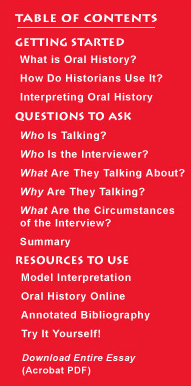talking history | syllabi | students | teachers | puzzle | about us

|

The topical range of oral history interviews is enormous, including everything from the most public of historical events to the most intimate details of private life. What is analytically important, however, is the way narrators structure their accounts and the way they select and arrange the elements of what they are saying. Interviews frequently are plotted narratives, in which the narrator/hero overcomes obstacles, resolves difficulties, and achieves either public success or private satisfaction. There are exceptions, of course, but these conventions, typical of much of Western literature, suggest something of the individualizing, goal-oriented, success driven, morally righteous tendencies of the culture and hence the underlying assumptions people use to understand their experiences. They also perhaps reflect the egocentric and valorizing tendencies of an interview, in which one person is asked, generally by a respectful, even admiring interviewer, to talk about his life. Comparison with interviews conducted with narrators outside the mainstream of western culture is instructive here. Interviewing Native American women from Canada's Yukon Territory, anthropologist Julie Cruikshank found that her questions about conventional historical topics like the impact of the Klondike gold rush or the construction of the Alaska Highway were answered with highly metaphoric, traditional stories that narrators insisted were part of their own life stories. Negotiating cultural differences about what properly constituted a life history thus became Cruikshank's challenge.* Narrators also encapsulate experiences in what I have come to term "iconic stories," that is concrete, specific accounts that "stand for" or sum up something the narrator reckons of particular importance. Often these are presented as unique or totemic events and are communicated with considerable emotional force. So, for example, one woman recounted the following incident from her childhood, illustrating the value she places on charity and self-denial:
Folklorist Barbara Allen has argued that the storied element of oral history reflects the social nature of an interview, for in communicating something meaningful to others, stories attempt to create a collective consciousness of what is important. Applying this notion to a body of interviews from the intermountain West, Allen identifies certain categories of stories--how people came to the West, their difficulties with the terrain and the weather, the "grit" required to survive--and suggests that these themes speak to a broad regional consciousness. Whether a given story is factually true or not is not the point; rather, its truth is an interpretive truth, what it stands for, or means.* As important as what is said is what is not said, what a narrator misconstrues, ignores, or avoids. Silences can signify simple misunderstanding; discomfort with a difficult or taboo subject; mistrust of the interviewer; or cognitive disconnect between interviewer and narrator. Interviewing an immigrant daughter about her life in mid-twentieth century Baltimore, I asked if she had worked outside the home after her marriage. She replied that she had not and we went on to a discussion of her married life. Later in the interview, however, she casually mentioned that for several years during her marriage she had waited tables during the dinner hour at a local restaurant. When I asked her about this apparent contradiction in her testimony, she said that she had never really thought of her waitressing as "work"; rather, she was "helping Helen out," Helen being the restaurant's owner and a friend and neighbor. Silences can also have broad cultural meaning. Italian historian Luisa Passerini found that life histories she recorded of members of Turin's working class frequently made no mention of Fascism, whose repressive regime nonetheless inevitably impacted their lives. Even when questioned directly, narrators tended to jump from Fascism's rise in the 1920s directly to its demise in World War II, avoiding any discussion of the years of Fascism's political dominance. Passerini interprets this as evidence on the one hand "of a scar, a violent annihilation of many years in human lives, a profound wound in daily experience" among a broad swath of the population and, on the other, of people's preoccupation with the events of everyday life--"jobs, marriage, children"--even in deeply disruptive circumstances.* Here's an example of an "iconic story" told by Lora Albright, an Idaho rancher, as she remembers the hardships of the great depression of the 1930s. What's the meaning of this particular story for Ms. Albright? What does her encounter with this destitute family seem to stand for, in her mind? What can we learn about her views of life from this story?
|
|||||||

|
||||||||
